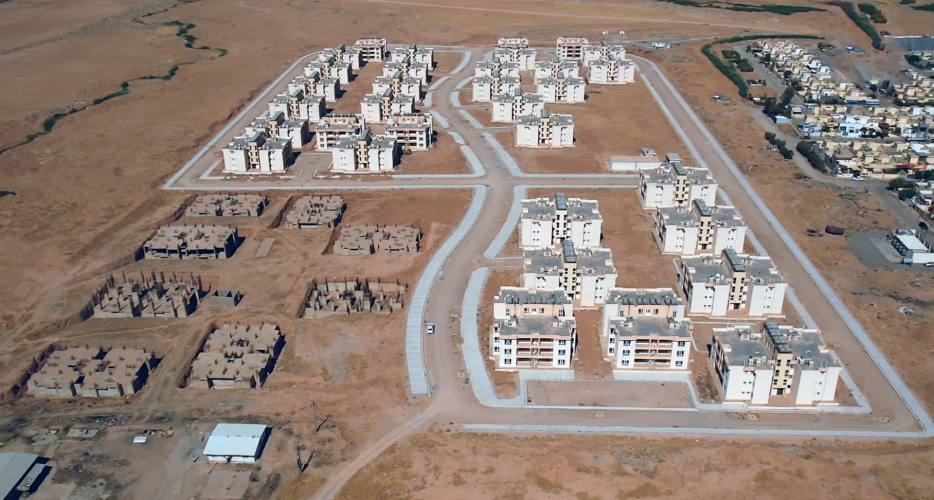
Peregraf
Hiwa Tahir has spent half his life renting a house and fears thathe will spend the other half waiting to receive a promised government apartment.
The ninth cabinet of the Kurdistan Regional Government (KRG) has announced the construction of more than 29,000 housing units, raising hopes for low-income residents that they will finally have stable and affordable housing. Yet delays mean that renters continue to rely on the increasingly expensive real estate market while waiting for their apartments to be completed.
“I spent my life in tenancy. I don’t want my children to live like this. I want them to own a house so they don’t have to spend money on rent each month,” said Tahir, a married 39-year-oldwith five children. Whenever the government has promoted a new housing scheme, he has signed up.
“I have not been given any hope of owning my own housing unit in the future,” he said, however. If he is allocated a unit, Tahir estimates that he would save 200,000 Iraqi dinars ($152) on rent each month, money that he could have spent on his children.
Barham Karadaghi, president of the Kurdistan Tenants Rights Protection Association, told Peregraf that “there are about 130,000 families in the Kurdistan Region who rent,” but that their problems are growing amid the dire economic circumstances and the failure of the KRG to pay salaries.
“We have dozens of problems with tenants being harassed by landlords for rent, all of which is related to the livelihood of citizens and lack of salaries,” Karadaghi said. The government programs would fulfil the housing needs of 22 percent of renters, if all of those properties go to that population.
However, the real estate market is heating up as thousands of families from central and southern Iraq begin to move to the Kurdistan Region. This means that rent prices are rising.
The current KRG approach consists of two programs. One planinvolves more than 9,000 units, which will be managed by the KRG Ministry of Construction and Housing (MOCAH). Requests for those apartments went live earlier this year. For thesecond program, 20,000 new units will be built under the supervision of the KRG Investment Board. Interested residents began filling out requests in mid-2022.
MOCAH Spokesperson Mariwan Mullah Hassan told Peregrafthat “there are 9,004 housing units in different stages. Some units are 95 percent complete and some are thirteen percent complete.” They are part of old government projects that were abandoned over the past decade due to lack of funding, but havenow restarted.
The projects where work is furthest along are located in Sulaimaniyah, Zergwez, Sitek, Bnaslawa, and Zakho. According to follow-ups by Peregraf, the Zergwez and Sitek developments were finished in 2010, but never hooked up to public serviceslike water and electricity.
Hassan said that MOCAH’s terms for the low-income renters consists of a 45 million Iraqi dinar principle paid in installments over 25 years. A pre-payment is not required. Those who have already received land grants from the government or own homes are not eligible for the program.
About 20,000 families have filled out request forms, more than double the number of units available. The greatest demand is in the area around Erbil.
Bargasht Akrayi, spokesperson for the KRG Investment Board, told Peregraf that the housing issue “has passed a good stage.Legal and administrative procedures have gone well.”
There were 159,000 requests filled out for the 20,000 units under the supervision of the KRG Investment Board. Of those, 50 percent were made for units in Erbil, 26 percent in Sulaimaniyah, eleven percent in Duhok, and thirteen percent inother areas.
In Sulaimaniyah, the units will be built on the Tasluja road and in Erbil they will be located in Garasur and Baghlumnara.
“We will select the names. The poor and needy people who are eligible will be prioritized,” said Akrayi. Those who benefit from the MOCAH scheme will not be eligible for the KRGInvestment Board program and vice versa.
The KRG occasionally announces other housing schemes as well, though they are rarely fulfilled in a timely fashion.
In July 2022, the Ministry of Endowment and Religious Affairsannounced a plan for housing units for religious teachers. Last month, the Ministry of Martyrs and Anfal Affairs told beneficiaries that the KRG would build them housing, but did not provide further details.
Many of these promises seem empty, Karadaghi told Peregraf.There is no set deadline for either the MOCAH or the KRG Investment Board apartments to be completed. “A foundation stone has not been laid anywhere in Kurdistan for a year and six months,” he said.
In the meantime, tenants will have to continue to rent, largely in private housing developments that are difficult for low-income residents to afford. They can cost more than $100,000 per unitand often have many up-front expenses.
Akrayi said that 47 investment projects were licensed this year, including 21 in Erbil, ten in Sulaimaniyah, nine in Duhok, four in the Garmian administration, one each in Halabja, Raparin, and Zakho. However, just eight were residential.